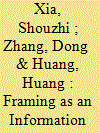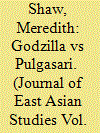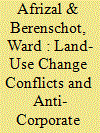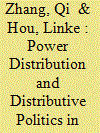|
|
|
Sort Order |
|
|
|
Items / Page
|
|
|
|
|
|
|
| Srl | Item |
| 1 |
ID:
186565


|
|
|
|
|
| Summary/Abstract |
How can authoritarian regimes effectively control information to maintain regime legitimacy in times of crisis? We argue that media framing constitutes a subtle and sophisticated information control strategy in authoritarian regimes and plays a critical role in steering public opinion and cultivating an image of competent government during a tremendous crisis. Using structural topic models (STM), we conduct a textual analysis of more than 4,600 news reports produced by seven Chinese media outlets during the COVID-19 pandemic. We find that Chinese media, instructed by the propaganda authorities, used a heroism frame to feature frontline medics’ sacrifices when saving others in need and resorted to a contrast frame to highlight the poor performance of the United States in the fight against COVID-19. We also show that both state and commercial media outlets used these two frames, though the tone of commercial media coverage was generally more moderate than the state media version.
|
|
|
|
|
|
|
|
|
|
|
|
|
|
|
|
| 2 |
ID:
186563


|
|
|
|
|
| Summary/Abstract |
South Korea's persistent enmity towards its erstwhile colonizer Japan has been a compelling topic of East Asian international relations scholarship for decades. This article argues that the historical evolution of South Korea's democracy offers a vital and overlooked piece of this puzzle. Given that it emerged from one of the most virulently anti-communist dictatorships of the Cold War period, in a society facing an ongoing threat from communist North Korea, any left-of-center opposition movement faced an uphill battle against severe anti-communism. In such circumstances, the only way for a leftist opposition party to survive was by pitting its stronger anti-Japan reputation against conservatives’ anti-communism. After South Korea's democracy stabilized, liberals tried and failed to overturn the anti-leftist institutions left over from the Cold War and then sought equilibrium through parallel rhetoric targeting pro-Japanese elements. Today, neither left nor right can afford to allow a final amicable settlement with its respective target of antagonism. Through analyses of domestic political rhetoric targeting alleged pro-Japanese or pro-communist elements, this paper demonstrates how these competing antagonisms achieved an uneasy equilibrium that undergirds South Korean political dynamics to this day.
|
|
|
|
|
|
|
|
|
|
|
|
|
|
|
|
| 3 |
ID:
186568


|
|
|
|
|
| Summary/Abstract |
While processes of land-use change have triggered conflicts across Asia, our knowledge of the responses of affected communities is largely based on case-studies. This review essay addresses this challenge by reviewing and synthesizing 49 studies of conflicts between rural communities and companies in order to identify salient characteristics of anti-corporate activism in Indonesia. We find that, in contrast to the ‘rightful resistance’ observed elsewhere, the strategies employed by rural communities in Indonesia are remarkably “rightless” as both their discourse and their conflict resolution efforts are marked by a remarkable irrelevance of laws, regulations and courts. Communities frame their claims mostly in terms of customary laws while largely relying on informal mediation by local authorities. We attribute this “rightless” character of land-use change conflicts to the weak legal protection of land rights in Indonesia and the relative powerlessness of communities in the face of collusion between authorities and companies.
|
|
|
|
|
|
|
|
|
|
|
|
|
|
|
|
| 4 |
ID:
186567


|
|
|
|
|
| Summary/Abstract |
Aung San Suu Kyi's National League for Democracy (NLD) won another landslide victory in the 2020 general election. Although there was widespread dissatisfaction with the government's poor management of the economy and ethnic conflicts, as well as with the pre-electoral coordination of ethnic parties in several states, opposition and ethnic-based parties had failed to gain more seats. Previous explanations had focused on the economy, electoral system bias, weak party institutionalization, and vote splitting among ethnic parties; however, they underestimated the significance of two contextual factors: military dominance of politics and ethnic conflict. This article argues that military dominance hindered normal political development in Myanmar. The anti-military sentiment favored the NLD, which made most Bamar voters disregard the party's poor economic performance. Despite the electoral system's bias, prolonged ethnic conflicts made ethnic parties that had fought for their community's causes more likely to maintain support. These arguments are verified by survey and electoral data sets. The military nullified the 2020 election claiming that electoral fraud was to blame, but the findings indicate that it was the political environment the military created that led to the victory of the NLD and some ethnic parties in the first place.
|
|
|
|
|
|
|
|
|
|
|
|
|
|
|
|
| 5 |
ID:
186562


|
|
|
|
|
| Summary/Abstract |
In the last three decades, many Asian democracies have decentralized their political systems to promote the democratic, equal, and efficient distribution of national resources across regions. Nonetheless, most of these countries, including South Korea, are still in a stage of “partial fiscal decentralization,” in which locally elected officials have spending authority, while a significant portion of their financing relies on transfers from the central government. This article argues that the decentralized distribution is significantly influenced by the partisan interests of central and local governments. The central government transfers more funds to local governments that their co-partisans govern, and local incumbents follow partisan policy priorities to obtain the allocation of available fiscal resources. This argument is strongly supported by the empirical analysis of subsidy transfers and regional social expenditures in South Korea from 2002 to 2015. First, we find that the central government in Korea transfers larger subsidies to politically aligned regions. Second, regional governments with larger subsidy transfers have higher levels of social expenditures. Third, governors or mayors affiliated with a progressive party spend significantly more on social welfare and education than do those affiliated with a conservative party.
|
|
|
|
|
|
|
|
|
|
|
|
|
|
|
|
| 6 |
ID:
186564


|
|
|
|
|
| Summary/Abstract |
Land fiscalization in China is a local development strategy intended to tilt the distribution of interests disproportionately toward local officials. We propose that the degree of power concentration among provincial Chinese leaders affects their need for support from lower-level bureaucrats. The more that power is dispersed among provincial leaders, the more they are incentivized to dispense benefits to local officials. To test this hypothesis, we used provincial-year panel data spanning 2003–2012 to examine how power concentration among provincial leaders affected land fiscalization within their jurisdictions. The empirical results robustly supported the hypothesis.
|
|
|
|
|
|
|
|
|
|
|
|
|
|
|
|
| 7 |
ID:
186566


|
|
|
|
|
| Summary/Abstract |
Anti-corruption efforts are inherently political. Corruption charges can be levied against political opponents as an instrument of repression; they can also be used against troublesome allies in the same party coalition to further consolidate power. In this paper, we focus on Indonesia and ask: Do major corruption charges follow a presidential electoral cycle—and if so, how? We contend charges against prominent members of the government coalition are more likely to happen before an election, allowing the government to replace intra-party rivals with loyal allies. Conversely, charges against prominent opposition members are more likely to happen after an election when fears of retaliation are low, opportunities for credit-claiming are high, and there is an incentive to remove veto players who may inhibit implementing the government's agenda. To test this argument, we use an original, newly assembled dataset of all major corruption charges—i.e., those involving high-profile politicians and garnering international attention—in Indonesia from 1998–2015 as reported in the Associated Press. We find a significant and robust relationship between the electoral calendar and major corruption charges. This relationship is robust across presidential administrations. These results yield insights into how anti-corruption efforts can become a political tool and counsel caution about the effectiveness of “good governance,” especially in new democracies. Finally, we discuss how contextual political factors external to Indonesia's anti-corruption commission, reinforce this empirical pattern.
|
|
|
|
|
|
|
|
|
|
|
|
|
|
|
|
|
|
|
|
|